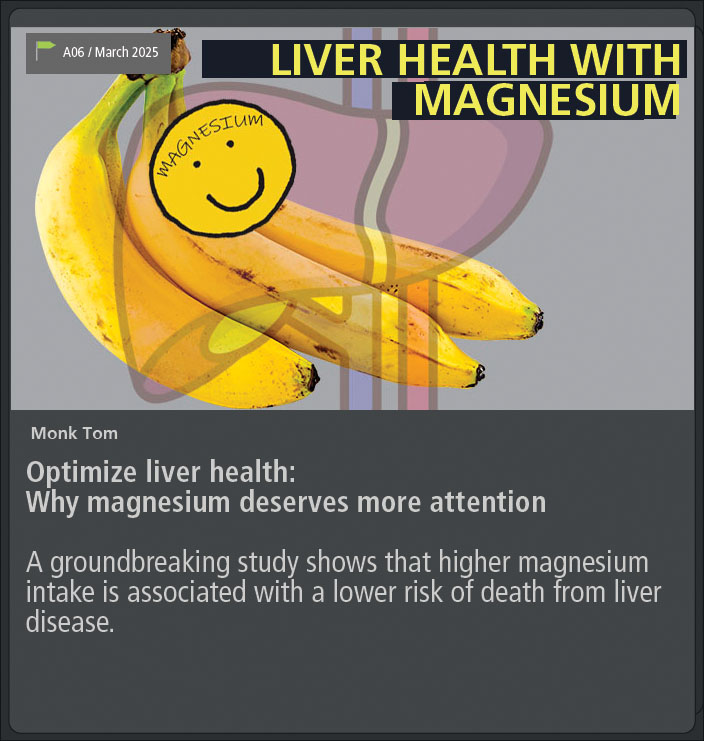LIVER HEALTH WITH MAGNESIUM


By Monk Tom
The liver is one of the most important organs in our body. It plays a central role in detoxification, digestion, and metabolism. However, like many other organs, the liver is susceptible to damage, especially due to unhealthy habits such as excessive alcohol consumption, poor diet, or lack of exercise. Chronic liver diseases such as non-alcoholic fatty liver disease (NAFLD), alcohol-related liver damage, or liver cancer are on the rise worldwide. What many people don’t know is that a specific nutrient could help reduce the risk of liver diseases – magnesium.
The Function of the Liver and the Role of Nutrients
The liver is a true multitasker: it produces bile, stores vitamins and minerals, regulates blood sugar levels, and filters toxins from the body. To perform these complex tasks, it requires a variety of nutrients. Particularly important are antioxidants, omega-3 fatty acids, and minerals like magnesium.
Magnesium is an essential mineral involved in over 300 biochemical processes in the body. It supports muscle and nerve function, regulates blood pressure, and contributes to energy production. A growing number of studies suggest that magnesium may also play a crucial role in the prevention and treatment of liver diseases.
How Magnesium Could Reduce the Risk of Liver Diseases
A groundbreaking study titled “Magnesium intake and mortality due to liver diseases” has shown that higher magnesium intake may be associated with a reduced risk of death from liver diseases. The researchers analyzed data from the Third National Health and Nutrition Examination Survey (NHANES III), a large cohort of 13,504 participants who underwent ultrasound examinations for hepatic steatosis.
The results were promising: for every 100 mg increase in magnesium intake, the risk of death from liver diseases decreased by 49%. This effect was particularly strong among individuals with hepatic steatosis (fatty liver) and alcohol consumers, although the interactions were not statistically significant. These findings suggest that magnesium may have a protective role in the prevention and treatment of liver diseases.
The underlying mechanism is not yet fully understood, but there is evidence that magnesium can inhibit inflammation and insulin resistance – two factors critical to the development and progression of liver diseases. Particularly in NAFLD, which is often considered a manifestation of metabolic syndrome, magnesium could play an important role.
Why Magnesium Stands Out: Comparison with Other Nutrients
Compared to other nutrients like calcium, magnesium stands out due to its versatile functions. While calcium is mainly known for its role in bone health, the study found no significant association between calcium intake and mortality from liver diseases. This underscores the unique importance of magnesium for liver health.
Another interesting aspect is the Ca:Mg ratio effect. A high calcium-to-magnesium ratio can potentially be harmful, as it may impair magnesium absorption. Therefore, it’s important to consume both minerals in a balanced ratio.
Lifestyle Changes to Improve Liver Health
To optimize liver health, it’s not enough to focus solely on magnesium intake. A holistic approach is crucial. Here are some practical tips:
1. Diet: Incorporate magnesium-rich foods into your diet, such as spinach, almonds, avocados, bananas, and whole grains. Mineral-rich water can also be a good source.
2. Exercise: Regular physical activity not only helps reduce excess weight but also improves insulin sensitivity and reduces inflammation – both factors that relieve the liver.
3. Stress Management: Chronic stress can burden the liver. Techniques such as meditation, yoga, or progressive muscle relaxation can help lower stress levels.
4. Alcohol Abstinence: If you regularly consume alcohol, you should reduce it or quit altogether. Alcohol is one of the main causes of liver damage.
5. Regular Check-ups: Early detection is key to treating liver diseases in time.
Call for Further Research and Awareness
Although the results of the NHANES III study are promising, the researchers emphasize that further investigations are necessary to confirm the observations. In particular, randomized controlled trials could clarify whether magnesium supplements should indeed be used for the prevention or treatment of liver diseases.
Moreover, it’s important to raise public awareness about the significance of magnesium. According to the National Health and Nutrition Examination Survey (NHANES), 79% of U.S. adults do not meet the recommended daily allowance for magnesium. Similar trends can be observed worldwide. Better education about the role of magnesium in preventing chronic diseases could help improve public health.
Conclusion
Magnesium is an inconspicuous but extremely important nutrient that can support liver health in various ways. The results of the NHANES III study suggest that higher magnesium intake may reduce the risk of liver diseases, especially in individuals with fatty liver or alcohol consumption. To fully harness the benefits of magnesium, it should be part of a healthy lifestyle based on balanced nutrition, regular exercise, and stress management.
It’s up to us now to recognize the importance of magnesium and take appropriate measures. Because a healthy liver is the key to a healthy life.
